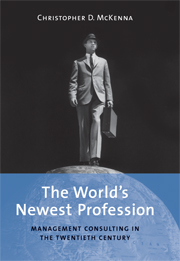Book contents
- Frontmatter
- Contents
- Series Editors' Preface
- Acknowledgments
- Introduction. Making a Career of Consulting
- 1 Economies of Knowledge: A Theory of Management Consulting
- 2 Accounting for a New Profession: Consultants' Struggle for Jurisdictional Power
- 3 How Have Consultants Mattered? The Case of Lukens Steel
- 4 Creating the Contractor State: Consultants in the American Federal Government
- 5 Finding Profit in Nonprofits: The Influence of Consultants on the Third Sector
- 6 The Gilded Age of Consulting: A Snapshot of Consultants Circa 1960
- 7 The American Challenge: Exporting the American Model
- 8 Selling Corporate Culture: Codifying and Commodifying Professionalism
- 9 Watchdogs, Lapdogs, or Retrievers? Liability and the Rebirth of the Management Audit
- Conclusion.The World's Newest Profession?
- Notes
- Index
7 - The American Challenge: Exporting the American Model
Published online by Cambridge University Press: 18 August 2009
- Frontmatter
- Contents
- Series Editors' Preface
- Acknowledgments
- Introduction. Making a Career of Consulting
- 1 Economies of Knowledge: A Theory of Management Consulting
- 2 Accounting for a New Profession: Consultants' Struggle for Jurisdictional Power
- 3 How Have Consultants Mattered? The Case of Lukens Steel
- 4 Creating the Contractor State: Consultants in the American Federal Government
- 5 Finding Profit in Nonprofits: The Influence of Consultants on the Third Sector
- 6 The Gilded Age of Consulting: A Snapshot of Consultants Circa 1960
- 7 The American Challenge: Exporting the American Model
- 8 Selling Corporate Culture: Codifying and Commodifying Professionalism
- 9 Watchdogs, Lapdogs, or Retrievers? Liability and the Rebirth of the Management Audit
- Conclusion.The World's Newest Profession?
- Notes
- Index
Summary
In the Autumn of 1967, Jean-Jacques Servan-Schreiber's, Le Défi Américain, or the “American Challenge,” became an immediate sensation in France, selling more than 400,000 copies in the first few months after its release. Servan-Schreiber argued that European economic problems, and particularly French ones, were not the result of poor fiscal or trade policies, but the direct result of the inability of European companies to compete with American organizations. Unless French executives adopted American-style management, they would become employees of the American conglomerates that were expanding into Europe. Although the public furor over Servan-Schreiber's work cooled down as the 1968 student strikes in Paris heated up, his message resonated with corporate executives who, during the previous decade, had tried to reshape their companies using what they perceived as superior American organizational forms.
Although many historians have written about the resulting “Americanization” of business in Europe in the 1960s and early 1970s, most accounts have focused on the fascination that European managers and politicians showed for American management. In contrast, this chapter will look not at the demand for American “knowhow,” but at its supply. The American management consulting firms that set up offices in Europe during the late 1950s and 1960s sold organizational know-how to French, German, Italian, British, Swiss, and Dutch executives. Servan-Schreiber himself highlighted that American management consulting firms were integral to the transmission of corporate organizational models, pointing out that hand in hand with the growth of American industrial subsidiaries in Europe, “the three American consultant firms with European branches (Booz Allen & Hamilton, Arthur D. Little, and McKinsey and Co.) have doubled their staffs every year for the past five years.”
- Type
- Chapter
- Information
- The World's Newest ProfessionManagement Consulting in the Twentieth Century, pp. 165 - 191Publisher: Cambridge University PressPrint publication year: 2006
- 1
- Cited by

